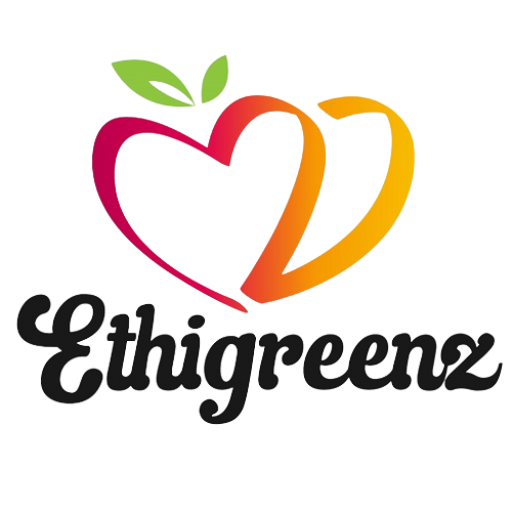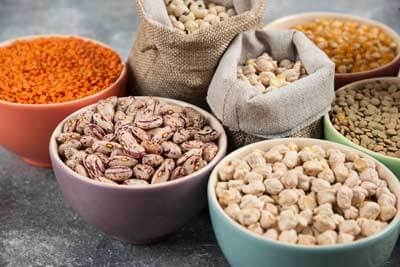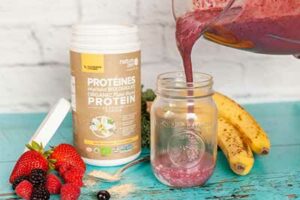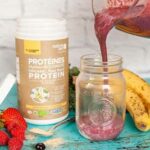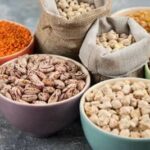Plant-based proteins are considered excellent vegan protein sources, as they are derived from plant-based food items and typically exhibit high protein content. Moreover, plant-based proteins tend to offer enhanced digestibility compared to animal-based proteins. In this article we will be talking about the 30 best vegan protein sources which are easily available and based on your preference and budget for protein intake, you can take your pick!
Veganism encompasses a dietary and lifestyle choice that promotes the consumption of plant-based foods, including vegetables, fruits, legumes, whole grains, and nuts, while excluding meat, eggs, and dairy products. While animal-based products are commonly recognized for their high protein content, it is important to note that vegans can indeed obtain sufficient protein by incorporating a diverse range of high protein vegan foods into their diet.
What are Proteins? A brief information
Proteins play a fundamental role as crucial constituents of life, being essential to the proper functioning of the human body. These complex molecules are constructed from a collection of more than twenty fundamental building blocks known as amino acids. Notably, our bodies do not store amino acids and therefore rely on either dietary intake or internal synthesis to obtain them.
9 amino acids are classified as essential amino acids which means they cannot be produced by our own body. In some cases, dietary supplements may be necessary to ensure an adequate intake of these essential amino acids if they are not sufficiently provided through regular diet planning. Beans, Lentils and some vegetables tend to contain low cysteine and methionine. On the other hand, grains, nuts, and seeds tend to be low in lysine. So a balance will help maintain it. Source: healthline.com
Plant Protein Vs Animal Protein
These two protein types possess unique attributes and considerations. Plant protein stands out for its comparatively lower levels of saturated fat, cholesterol, and calories, making it an advantageous option for individuals who are conscious about health and/or environment. From health perspective, plant protein is lower in saturated fat, has no cholesterol and decreases the risk of heart diseases. In addition, vegan protein sources are also rich in fibre, vitamins, antioxdants contributing to overall well-being.
In contrast, animal protein exhibits differing characteristics. It is associated with providing a complete range of essential amino acids required by the body but excessive consumption of animal protein has been linked to a heightened risk of certain health conditions and specific types of cancer. Therefore, the selection between plant protein and animal protein hinges on factors like personal dietary preferences, health objectives, and ethical perspectives.
- High Protein Vegan Foods are rich in dietary fibre which help your gut, maintain sugar levels. Fibre content in animal based foods are limited.
- Plant Based Foods have lower calories than meat food. Thereby, it helps you maintain your Body Weight.
- Plant Based Protein helps you lower you Blood Pressure thereby lowering the chances of hypertension.
- Plant based proteins have higher amount of antioxidants in some foods as well which is good for your health.
- Overall, a well-planned plant based protein diet helps you lower cholesterol, reduce risk of cancer, heart diseases, makes you more energetic, has more antioxidants, digests faster and much more.
Although, if your diet isnt well planned for all nurients, vegan and vegetarian diets do need to eat plant based supplements.
A very good documentary was released recently by Arnold & Jackie Chan about the important of plant based proteins and how they enable the human body to do more than it could do. Athletes came forward and told everyone on how it improved their fitness and energy levels. Come to think of it, the largest and strongest animals on earth (land) are Vegetarians. Elephants, Girafe, Apes… you get the idea.
30 Best Vegan Protein Sources
This is what you have been waiting for, so let’s quickly share those.
- Lentils: In addition to being an excellent source of protein, lentils offer a good amount of dietary fiber, folate, and iron, making them a nutritious choice for promoting heart health and supporting digestion.
- Chickpeas: Along with their protein content, chickpeas provide fiber, folate, and manganese. They contribute to satiety, assist in blood sugar regulation, and support bone health.
- Quinoa: Being a complete protein source, quinoa contains all essential amino acids. It is also rich in fiber, magnesium, and antioxidants, promoting healthy digestion and providing a good source of energy.
- Chia seeds: These tiny seeds are packed with protein, fiber, omega-3 fatty acids, and antioxidants. They aid in digestion, promote heart health, and contribute to brain function.
- Hemp seeds: Offering a high-quality plant protein, hemp seeds are also rich in omega-3 fatty acids, fiber, and minerals. They support cardiovascular health, reduce inflammation, and promote skin health.
- Almonds: Besides being a protein-rich nut, almonds provide healthy fats, vitamin E, and magnesium. They promote heart health, help in weight management, and aid in functions of brain.
- Black beans: With a combination of protein and fiber, black beans also provide folate, iron, and antioxidants. They support digestive health, contribute to blood sugar control, and offer immune-boosting properties.
- Pumpkin seeds: These seeds are a great source of protein, healthy fats, magnesium, and zinc. They support prostate health, aid in sleep regulation, and provide immune-boosting benefits.
- Edamame: High in protein and fiber, edamame also contains folate, vitamin K, and magnesium. It supports bone health, aids in muscle recovery, and contributes to hormonal balance.
- Tempeh: Along with being a protein source, tempeh is a probiotic-rich food. It provides gut health benefits, supports bone density, and offers a good amount of iron and calcium.
- Spirulina: It’s a blue-green algae which is rich in protein, vitamins, and minerals. It boosts the immune system, supports detoxification, and provides antioxidant properties.
- Peanut butter: A good source of protein and healthy fats, peanut butter also offers vitamin E, niacin, and magnesium. It supports heart health, aids in weight management, and provides energy.
- Tofu: Made from soybeans. It offers calcium, iron, and magnesium, supporting bone health, providing antioxidant properties, and aiding in muscle function.
- Yellow Peas: They serve as a valuable plant-based protein source, especially for individuals following vegan, vegetarian, or plant-focused diets. Yellow peas contain a moderate to high level of protein, making them an appealing option to incorporate into meals. Additionally, yellow peas are frequently processed to create pea protein powder, a popular supplement among those seeking to boost their protein intake. By including yellow peas or incorporating pea protein powder into your diet, you can obtain essential amino acids and contribute towards fulfilling your daily protein requirements.
- Oats: While not a high-protein source, oats contain fiber, manganese, and antioxidants. They support digestion, assist in blood sugar control, and promote satiety.
- Spinach: In addition to its moderate protein content, spinach is rich in iron, vitamins, and antioxidants. It supports eye health, aids in blood pressure regulation, and provides anti-inflammatory properties.
- Seitan: Made from wheat gluten, seitan is a high-protein, low-fat option. It provides iron, selenium, and phosphorus, supporting muscle growth, aiding in metabolism, and contributing to bone health.
- Green peas: These legumes offer protein, fiber, and various vitamins and minerals. They support heart health, aid in digestion, and contribute to eye health.
- Cashews: While being a protein source, cashews also provide healthy fats, vitamin E, and minerals. They support heart health, aid in weight management, and provide antioxidant properties.
- Amaranth: This gluten-free grain offers protein, fiber, and minerals such as manganese and magnesium. It supports bone health, aids in digestion, and provides immune-boosting benefits.
- Brown rice: Although not high in protein, brown rice offers fiber, manganese, and selenium. It aids in digestion, supports heart health, and provides energy.
- Sunflower seeds: These protein-rich seeds also contain healthy fats, vitamin E, and minerals. They support skin health, aid in inflammation reduction, and contribute to a healthy immune system.
- Flaxseeds: Rich in protein, omega-3 fatty acids, and fiber, flaxseeds provide heart-healthy benefits, support digestion, and aid in hormonal balance.
- Buckwheat: This nutrient-dense pseudocereal offers protein, fiber, and minerals like magnesium and copper. It supports heart health, aids in blood sugar regulation, and provides antioxidants.
- Broccoli: While not a high-protein vegetable, broccoli is rich in fiber, vitamins, and minerals. It supports immune function, aids in digestion, and provides anti-inflammatory properties.
- Mung beans: These legumes are nutrient-dense, providing protein, fiber, and folate. They support gut health, aid in blood sugar control, and contribute to cardiovascular health.
- Walnuts: These protein-packed nuts offer healthy fats, antioxidants, and minerals. They support brain health, aid in inflammation reduction, and provide cardiovascular benefits.
- Pinto beans: With a combination of protein and fiber, pinto beans also offer folate, iron, and potassium. They support digestion, contribute to heart health, and provide energy.
- Mushrooms: While not a high-protein source, mushrooms offer fiber, vitamins, and minerals. They support immune function, aid in inflammation reduction, and provide antioxidant properties.
- Silken tofu: Soft and smooth tofu variation provides protein, calcium, and iron. It supports bone health, aids in muscle function, and contributes to a well-rounded plant-based diet.
These plant protein sources, along with their additional qualities, can be combined in various ways to create a balanced and nutritious diet.
A lot of these vegan protein powders are available on Amazon. By clicking on this link, you’ll be directed to a search page of vegan powders where you can try out any of the available products.
What is the difference between Protein and Isolate?
Protein and isolate are two distinct terms related to the realm of protein. Here’s a breakdown of their differences:
Protein: Protein is a vital macronutrient composed of amino acids, which play crucial roles in various bodily functions. It is present in a wide array of foods, encompassing both animal-based and plant-based sources. Protein types can be categorized based on their origin, such as whey protein, casein protein, soy protein, or pea protein, among others.
Isolate: Isolate refers to a specific form of protein that undergoes a more extensive refinement process to yield a highly concentrated protein product. For instance, whey protein isolate involves separating whey protein from the liquid part of milk and eliminating a significant portion of carbohydrates (like lactose) and fats. This meticulous process results in a protein product that typically contains over 90% protein by weight.
The fundamental disparity between protein and isolate lies in their composition and processing methods. Protein serves as a broad term encompassing diverse amino acid sources, while isolate specifically denotes a concentrated protein form attained through additional refining steps to remove other accompanying substances. Isolates are commonly preferred by individuals seeking a high-protein product with minimal carbohydrates, fats, or other macronutrients.
Let’s take example of Soy here:-
Soy Protein –
- Minimally Processed Foods like Tofu
- Contains Protein along with Fats, Nutrients & Carbs
- Fat (11g in 130g of Tofu)
- Calories are Double than Isolates
- Used as regular household food items
- Not Water Soluble as Milk Powder
Soy Isolate –
- Highly Processed
- Contains majorly Protein, with nutrients, fats & carbs stripped away
- Fat & Calories are considerably reduced
- Used in Body Building Products.
- Low in Fiber Compared to Soy Protein Foods
- Made to be water soluble to be used in shakes etc.
Does vegan protein powder contain amino acids?
Yes, vegan protein powders contain amino acids. Plant powder sources such as peas, rice, hemp, or soy can be found easily. Different plant-based protein sources have varying amino acid profiles. SO it’s best to combine various ones together or keep alternating the products. Pea protein is one of the most versatile proteins in the food industry. It can be added to meat products, dairy foods, bakery products, and even condiments. Pea protein is also becoming popular in beverages like sports drinks and protein powders. It is an easy way to add more protein to your diet.
To know more about plant protein powders, visit THIS article.
Disclaimer: All Articles are personally researched online or by personal experience and are only for information purposes and in no way provide medical advice. Do check with a doctor for suitability of products for your body.
